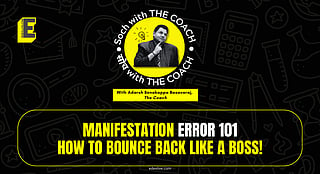
“I have been dreaming of this moment for 10 years.”
These words were spoken by the proud World Chess Champion of 2024, D Gukesh, giving us a glimpse of his phenomenal journey.
The internet is buzzing with admiration for his accomplishment, and rightly so.
What makes this victory even more remarkable is that Gukesh has been manifesting it since he was six years old. His relentless focus and belief in his dream paved the way to his success. Yet, let’s be real — not all of us are so fortunate.
Dreaming big, manifesting goals, and picturing ourselves basking in success are universal ambitions, whether we are dreaming of becoming doctors, engineers, pilots, business tycoons, or anything else. However, life doesn’t always cooperate. Sometimes, it drags us down roads we never planned to take, leaving us with disappointment instead of triumph.
So, what do you do when all your manifesting and hard work leads to a dead end? Don’t sweat it. Let me guide you through bouncing back stronger than ever.
Your dream didn’t pan out? Big deal. Shift your perspective and take charge of the lessons hidden in your experience. Every disappointment carries a valuable gem of knowledge. Let’s borrow a tool from Cognitive Behavioral Therapy (CBT) to reframe your story.
Instead of saying, “I failed,” try saying, “I learned”. Reflect on what this experience taught you about yourself. Journaling can help uncover these lessons. Even if you think there’s nothing positive to take away, remember this: it taught you your limitations — and knowing those is powerful.
As I often say, “The biggest strength we can develop is understanding our weaknesses”. Embrace that wisdom, and you’re already halfway there.
If your best friend stumbled upon a harsh situation, would you criticise them? Of course not. You would be their biggest cheerleader, encouraging them to keep going. So why not treat yourself the same way?
Co-founder of the Center for Mindful Self-Compassion, Dr Kristin Neff’s self-compassion theory teaches us the value of treating ourselves with kindness. Start by writing a pep-talk letter to yourself. Channel your inner superhero and remind yourself of your strengths, achievements, and the incredible potential that lies ahead.
Rome wasn’t built in a day, and neither will your dreams. The secret sauce? Micro-goals. Behaviour-change expert BJ Fogg advocates breaking big goals into manageable steps. I call this 'chunking it down'.
For example, I’ve been planning to launch a podcast. Instead of overwhelming myself with the entire process, I started small. For example, brainstorming topics for five episodes. That simple step made the task feel achievable.
Break your goals into tiny chunks and tackle them one at a time. Before you know it, you’ll have built something incredible.
Life isn’t just about the destination — it’s about the journey. Dr Carol Dweck’s growth mindset approach emphasises focusing on effort rather than results. Celebrate the process itself and take pride in the risks you’ve taken, the skills you’ve learned, and the experiences you’ve gained.
Every step forward, no matter how small, is a victory. By loving the process, you’ll find fulfilment even when the outcome isn’t what you envisioned.
Dreams evolve, and so do we. Sometimes, a goal that once seemed vital no longer aligns with who we are. Existential therapists encourage us to let go of dreams that no longer serve us.
Take it from me — I come from a family of paediatricians and once dreamed of becoming a doctor. Letting go of that dream wasn’t easy, but it helped me pivot toward something that aligns with my current values and passions. Reflect on whether your dream still fits your life’s direction. If it doesn’t, let it go guilt and pivot with grace.
Gukesh may have become the ultimate “Sharma ji’s Beta,” but comparison is the ultimate killjoy. Social media only shows highlights as reels, not the messy struggles behind success. The same goes for those perfect kids you’re being compared to. For all you know, they might be battling problems you can’t see.
The takeaway? Stop comparing yourself to others. Trust me, nobody’s perfect — not even the neighborhood’s favorite overachiever. Focus on your own path and achievements.
Success is rarely a solo journey. Positive psychology highlights the importance of community and surrounding yourself with supportive people. Genuine connections can lift you up when you are feeling down.
Recently, I added two amazing people, Anil Santhapuri and Charu Rao, to my tribe. Though I have known them for only a short time, their positivity and support have made a huge impact on me. A kind word or thoughtful gesture from your tribe can make all the difference.
So find a group of like-minded dreamers who share your struggles and victories. Together, you can achieve more than you ever could alone.
Negativity is like garbage — it’s best to throw it out and never look back. Letting go doesn’t mean giving up. It means clearing space for what’s next. Psychologists call this 'goal detachment'.
Here’s a tip: Write down the goal you weren't able to achieve, thank it for what it taught you, and burn the paper (with caution, of course). The act of releasing it can feel incredibly freeing. By letting go of the baggage, you’re making room for new opportunities.
The bottom line? You’re still a boss! Period!
Life’s curveballs don’t define you — your resilience does. Every failure is a stepping stone to success, and every setback is an opportunity to grow stronger.
Dust off that crown, adjust your mindset and keep slaying. My failures taught me everything I know about resilience and self-discovery. Without them, I wouldn’t have the passion or knowledge I have today.
So, when life closes a door, don’t search for a window. Build your door — and then build a palace with the bricks life throws your way.
With Regards,
Adarsh Benakappa Basavaraj,
Your manifested guide.
